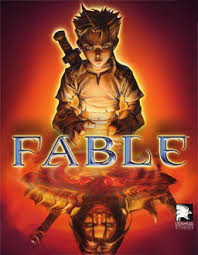fable
英 [ˈfeɪ.bəl]
美 [ˈfeɪ.bəl]
- n. 寓言;无稽之谈
- vi. 编寓言;虚构
- vt. 煞有介事地讲述;虚构
- n. (Fable)人名;(法)法布勒;(英)费布尔
使用频率:

记忆方法
将“fable”与“fa-bu-lous”(极好的)结合记忆,想象一个故事(fable)非常吸引人,以至于听起来像是在讲述一件奇妙(fabulous)的事情。通过这种故事性和奇妙性的联系,可以更容易地记住“fable”的意思是寓言或故事。
以上内容由AI生成, 仅供参考和借鉴
中文词源
fable 寓言
来自PIE*bha, 说,词源同phone, fame. 指说的故事,寓言等。
英语词源
- fable
-
fable: [13] The Indo-European base *bha- ‘speak’ has produced a wide range of English words, including (via Germanic) ban and (via Latin fārī ‘speak’) affable, confess, fairy, fame, fate, ineffable, infant, nefarious, and profess. Fable is a member of this latter group; it comes via Old French fable from Latin fābula ‘narrative, story’ (source also of English fabulous [15]), which was a derivative of fārī. Fib [17] is probably short for an earlier fible-fable ‘nonsense’, a fanciful reduplication of fable.
=> affable, ban, confess, fabulous, fairy, fame, fate, fib, ineffable, infant, nefarious, profess, prophet - fable (n.)
- c. 1300, "falsehood, fictitious narrative; a lie, pretense," from Old French fable "story, fable, tale; drama, play, fiction; lie, falsehood" (12c.), from Latin fabula "story, story with a lesson, tale, narrative, account; the common talk, news," literally "that which is told," from fari "speak, tell," from PIE root *bha- (2) "speak" (see fame (n.)). Restricted sense of "animal story" (early 14c.) comes from Aesop. In modern folklore terms, defined as "a short, comic tale making a moral point about human nature, usually through animal characters behaving in human ways" ["Oxford Dictionary of English Folklore"].
权威例句
- 1. The old fable continues to echo down the centuries.
- 这则古老的寓言流传了数个世纪。
- 2. Is reincarnation fact or fable?
- 转世轮回是确有其事还是无稽之谈?
- 3. a land rich in fable
- 寓言之乡
- 4. The course is about fable and legend in modern literature.
- 这门课专讲现代文学中的神话和传奇作品.
- 5. This fable was written after the manner of Aesop.
- 这部寓言是仿照《伊索寓言》写成的.